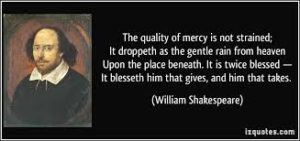
The word “strained” in this context means “constrained” or “forced.” In The Merchant of Venice Portia begs Shylock for mercy. She is saying that mercy must be freely given.
We often confuse mercy with something that must be earned or deserved, but if that were the case the action would not be “mercy.”
Shakespeare‘s thirty-two words are packed with truisms and a week’s worth of food for thought during our meditations. First, mercy must not be forced but freely given. Second, there is nothing more pleasant than a gentle rain that brings refreshment and clean air. I find myself considering how can I show mercy when I think of Shakespeare’s gentle rain. Third, we realize that mercy is twice blessed. The giver receives as much or more than the recipient.
One of the most famous lines in the Bible is found in Micah 6:8. — “And what does the LORD require of you? To act justly and to love mercy and to walk humbly with your God.”
I find it interesting and somewhat disconcerting that we hear a lot about the qualifications for a Supreme Court Justice these days, but I have yet to hear one commentator ask or comment on the quality of mercy possessed by the potential nominees. I for one want to know what is in the heart of a judicial candidate more than where he went to school or where he or she stands on constitutional interpretation.
Can you imagine a Senator asking a candidate, “Do you love mercy?”





Leave a Reply +